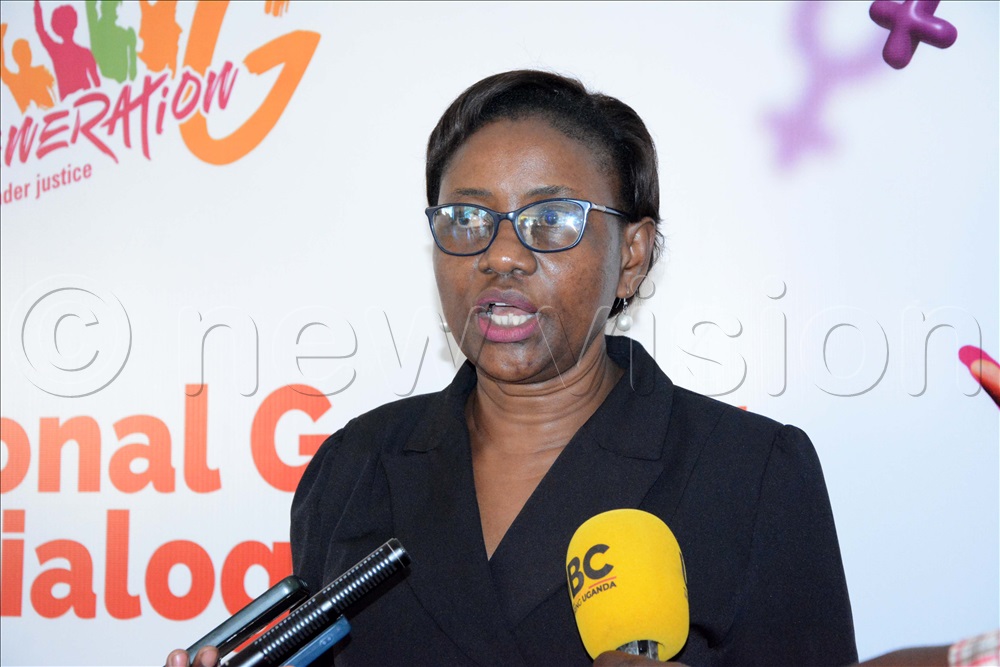Activists vouch for state-funded legal aid for GBV victims
Adriko said the fight against gender-based violence is a national matter that requires both financial and legislative support from the Government.
Lilian Byarugaba Adriko, the Chief Executive Officer of FIDA addressing journalists during the National Justice dialogue at Golf Course Hotel on August 7, 2025. (Photos by Mary Kansiime)
________________
Gender activists have urged the Government to provide free legal services to victims of gender-based violence (GBV) as part of efforts to combat the vice.
They argue that most of the affected persons are vulnerable and therefore unable to access legal services.
Speaking during the National Gender Justice Dialogue in Kampala, Lillian Byarugaba Adriko, the executive director of the Uganda Association of Women Lawyers (FIDA-Uganda), said the fight against gender-based violence is a national matter that requires both financial and legislative support from the Government.
Adriko pointed out that a section of GBV victims struggle to access justice, something she said infringes on their individual rights.
She stressed that such people should be supported by established policies, but argued that the Government is yet to extend free services to such categories.
"For the last five years, we have had our efforts centred at ensuring accessibility to legal aid by all gender-based violence victims. I'm sad that to date, we are still fighting for the same. I appeal to government to fast-track this matter," Adriko said.
Adriko was speaking at the Golf Course Hotel in Kampala on August 13, 2025, during the closing event of the five-year-long programme dubbed Generation Gender (Gen G).
The programme has been running in six districts and was supported by FIDA-Uganda in partnership with Reach A Hand Uganda and the Centre for Health, Human Rights and Development (CEHURD), with funding from the Dutch Government.
While at the event, Frederieke Quispel, the Dutch Ambassador to Uganda, commended the Government’s efforts in ending gender-based violence, highlighting the legal frameworks put in place.
She, however, called on the Government to address implementation gaps, saying this would help the country maintain its position in promoting gender equality.
"I want to categorically state that Uganda is doing well in ensuring gender equality. We are here to supplement efforts so that you (Ugandans) maintain the top position," Quispel said.
On her part, Fatia Kiyange, the executive director of CEHURD, noted that young men and women in the country are facing social injustices due to their inability to pay for legal services.
Fatia Kiyange, the Executive Director of the Centre for Health, Human Rights and Development addressing journalists during the National Justice Dialogue at Golf Course Hotel on August 7, 2025.
"We want government to consider having a public legal aid programme to enable the vulnerable poor to access social justice," Kiyange said.
According to available data, gender-based violence is a pervasive issue in Uganda, with high prevalence rates reported across various forms of abuse.
A significant percentage of women and girls experience physical, sexual, emotional or economic violence. For example, one study found that 95% of women and girls have experienced some form of violence, according to the United Nations in Uganda.
Furthermore, 56% of women aged 15 to 49 reported experiencing physical violence, and 22% reported experiencing sexual violence since the age of 15, according to None In Three.
The Generation Gender programme aims to create gender-just and violence-free societies for young people. It focuses on addressing gender-based violence, the unequal division of care, and women’s lack of access to civic space.
The project is implemented in Uganda by Reach A Hand Uganda, FIDA Uganda and CEHURD, with support from Sonke Gender Justice, Rutgers International and the Dutch Ministry of Foreign Affairs.
Background
Gender-based violence remains one of the most widespread human rights violations in Uganda, disproportionately affecting women and girls.
According to data from the Uganda Bureau of Statistics (UBOS), 95% of Ugandan women have experienced physical and sexual violence since the age of 15.
While progress has been made through key legal frameworks such as the Domestic Violence Act (2010) and the National Gender Policy (2007), implementation gaps, cultural stigma and underreporting continue to limit access to justice and meaningful protection.
Over the past five years, the Generation Gender programme has been implemented in six districts: Kapchorwa, Kween, Bukwo, Namutumba, Adjumani and Iganga.
The project has applied a gender-transformative approach that places youth at the centre, equipping them with tools, knowledge and opportunities to challenge power imbalances and advocate for gender justice.
As a result, the programme has highlighted the importance of engaging young men in the fight against GBV, amplifying the voices of young women and marginalised groups, and strengthening the resilience of civil society organisations.